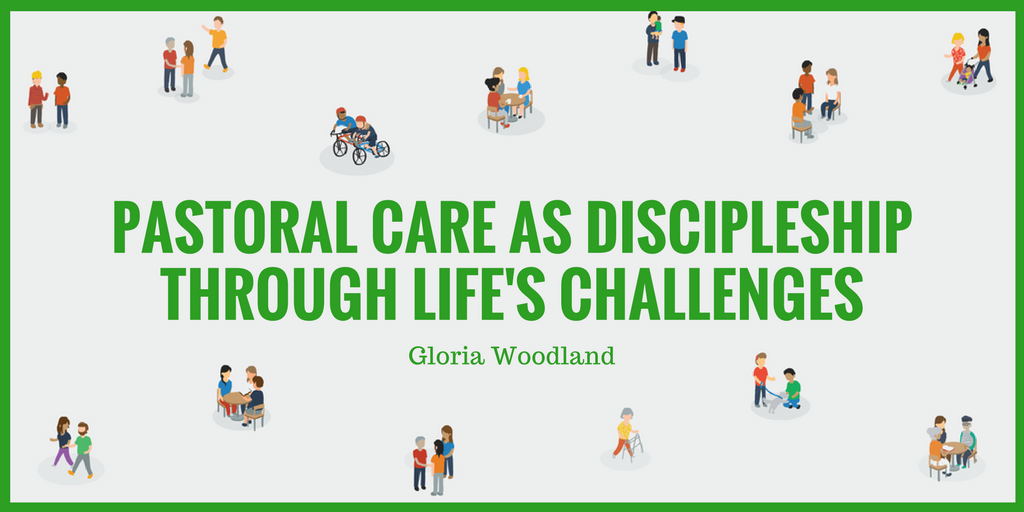Pastoral Care as Discipleship through Life's Challenges
 As I sat in church, I saw her: burden showing on her face with tears gently flowing over her cheeks. I moved quietly from where I was to sit at her side and said, "Can I help?" This woman was not new to the congregation—not a seeker, but a longtime member. The sadness in her eyes matched her sorrowful words as she said, "I don’t think I can tell anyone in church what is really going on in my life."
As I sat in church, I saw her: burden showing on her face with tears gently flowing over her cheeks. I moved quietly from where I was to sit at her side and said, "Can I help?" This woman was not new to the congregation—not a seeker, but a longtime member. The sadness in her eyes matched her sorrowful words as she said, "I don’t think I can tell anyone in church what is really going on in my life."
A heaviness came over me and lingered with me as I reflected on the depth of what she was saying. This woman feared sharing her burden with believers. How could that be? In the times of life's great challenges, we need to be drawn not just to the house of the Lord, but to the community of believers. Pastoral care—the demonstration of Christ’s compassion—should be found within the community of faith.
Charles Gerkin wrote of the need to rediscover the congregation as the primary agents of care for the members, saying that "in a sense, we who have from generation to generation made up the Christian community have always known that the primary source of Christian nurture and care lies in the gathering together of God's people" [1]. Gerkin asserts that while knowing this, we as a community of believers have given the dominant emphasis of this ministry to the ordained. It is important therefore for each of us as believers to remember that the term pastoral as used in our Judeo-Christian tradition has a communal connotation denoting the care of the community for its members. Ronald Sunderland states, "It derives from the figurative language of Jewish scriptures and, supremely, from the Lord's care of Israel (Psalm 23, 80)" [2].
As I sat with the woman who was burdened by life, could I enter her story, hear it for what it was, and demonstrate God as not only present, but active in her life? Could I enter in without the platitudes or the rush for her to claim victory? Could I just be with her in her challenge until she could see her burden in Christ's hands?
Theologian Shelly Rambo believes we as caring believers in community can strengthen the discipleship of others as we enter the Holy Saturday experiences of people’s lives. Rambo, reflecting on the events of Easter, wants us to pay attention to the space between Christ's death and resurrection. Rambo asserts that we don’t pay attention to the space between because we know the outcome is resurrection. "Believing in the promise of resurrection doesn’t eliminate suffering—and in witnessing this suffering, we are about the work of redemption" [3].
When the Risen Lord appeared to Thomas, he showed him the wounds on his hands. The resurrection had happened, but the wounds remained. Thomas's faith grew because of the wounds. In our lives, and the lives of those in our communities of faith, life will have challenges and times of suffering. Let's not rush to claim victory; let's enter the Holy Saturday of their lives so that their faith is strengthened as a disciple of Christ.
Gloria Woodland (DMin) is Assisant Professor of Chaplaincy Studies and Spiritual Care at MB Seminary and Chaplaincy Program Director at ACTS Seminaries. Dr. Woodland was the organizer and keynote speaker at an event called Medical Assistance in Dying: Walking Pastorally With Those Impacted By It and she will be a presenting a workshop at Equip 2017 Study Conference: Transforming Discipleship.
[1] Charles V. Gerkin, An Introduction to Pastoral Care (Nashville: Abingdon Press, 1997), 92.
[2] Ronald H. Sunderland, Dictionary of Pastoral Care and Counselling, ed. Rodney J. Hunter (Nashville: Abingdon Press, 1990), 213.
[3] Shelly Rambo, "The Space Between Death and Resurrection" in Faith & Leadership, July 28, 2014.
